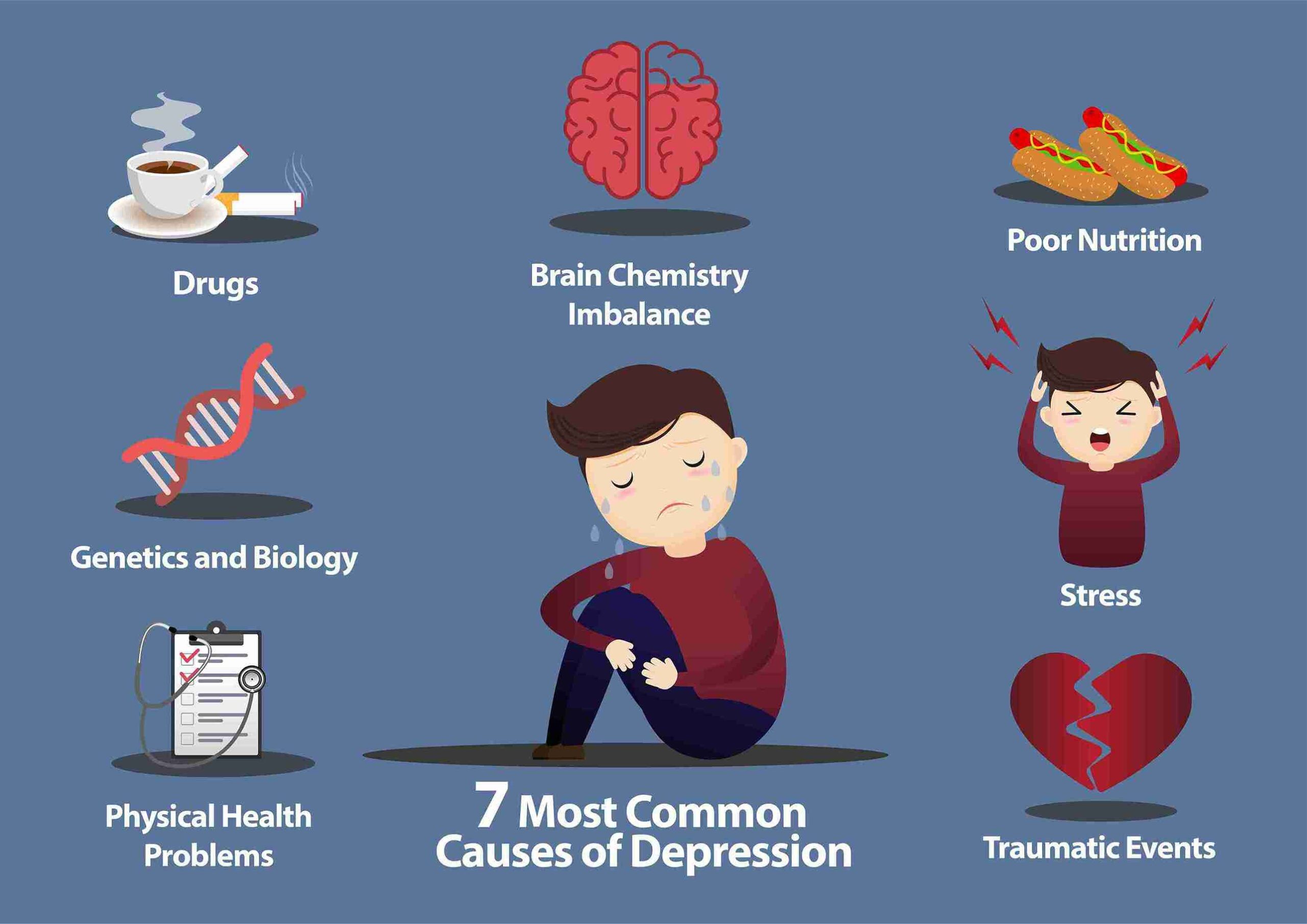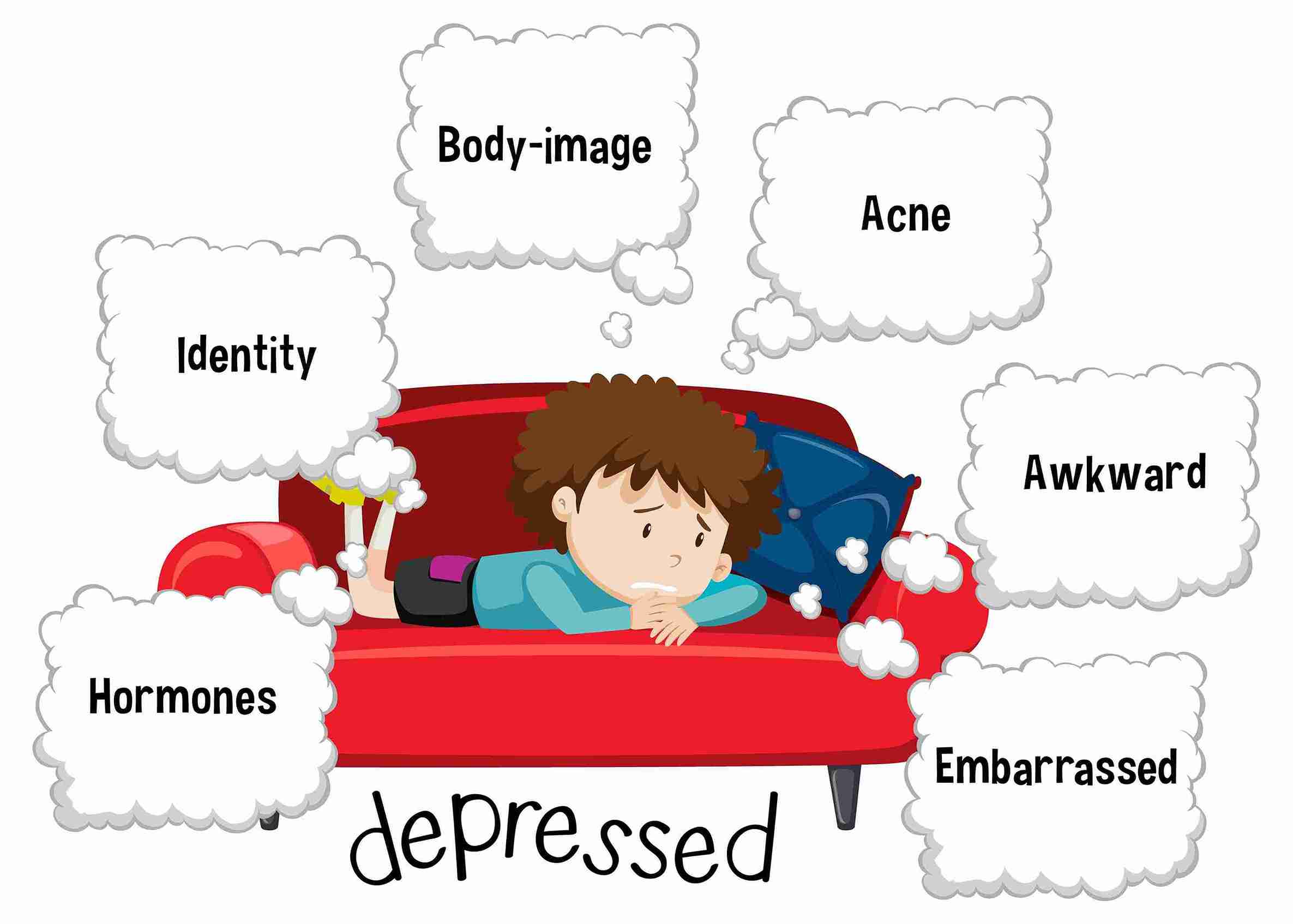High-Functioning Depression: The Silent Struggle Behind a Smile “Depression isn’t always easy to see,” explains psychologist Dr. Dawn Potter. “Some people appear to be doing fine on the surface while struggling deeply inside.”High-functioning depression means managing life’s demands while feeling emotionally drained. High-functioning depression may be difficult to detect from the outside, yet it creates significant problems on the inside.People with this condition might look fine and keep up with daily tasks, yet they feel sad, hopeless, or empty. Seeking help is essential. Therapy, lifestyle changes, or medication can help reduce symptoms and bring relief. Don’t let the façade of normalcy keep you from receiving the help you need.
Understanding the Causes and Risk Factors of High-Functioning Depression
1.Genetics and Family Influence
A family history of depression or mood disorders increases the likelihood of having high-functioning depression. Genetic factors can alter brain chemistry, impairing emotional regulation and growing vulnerability to depressive illnesses.

2.Ongoing Stress
Chronic stress from personal, work, or financial challenges can trigger or worsen depression. When stressors build up over time, they can overwhelm an individual, leading to persistent sadness or inadequacy.
3.Past Trauma or Abuse
Past experiences of trauma or emotional abuse, especially in childhood, can leave a lasting impact. These unresolved issues can resurface as depressive symptoms, sometimes manifesting as high-functioning depression, where an individual appears to cope but struggles internally.
4.Internalized Emotions
People with high-functioning depression may be prone to self-criticism or feelings of guilt and shame. These negative emotions can contribute to emotional exhaustion, hiding behind an outward routine.
5.Perfectionism and High Expectations
Individuals with high-functioning depression may have perfectionistic tendencies, setting unrealistically high standards for themselves. The pressure to satisfy these expectations, along with the dread of failure, can exacerbate depression symptoms.
6.Chemical Imbalances of the Brain
Imbalances in neurotransmitters, such as serotonin and dopamine, have been related to mood disorders, including depression. These imbalances can make it harder to maintain emotional stability, even when an individual appears to be functioning normally.
7.Negative Thought Patterns
People with high-functioning depression often engage in distorted thinking, such as expecting the worst outcomes or focusing on flaws. These cognitive patterns reinforce feelings of despair and prevent individuals from seeing the positive aspects of their lives.
8.Lack of Social Support
Even if someone seems to manage their responsibilities effectively, a lack of deep emotional connections or support can increase feelings of isolation and worsen the symptoms of depression. Individuals who do not have a solid support system may find it challenging to seek help.
What happens when high-functioning depression is combined with substance abuse?
To effectively treat a dual diagnosis, both the addiction and the mental health problem must be addressed simultaneously. These issues are closely linked, making it challenging to fully recover from one without managing the other.Ignoring depression can hinder progress in overcoming addiction, while untreated addiction may lead to recurring episodes of depression.

Treatment for a wide array of substance use disorders, including:
- Alcohol addiction
- Opioid addiction
- Heroin addiction
- Cocaine addiction
- Prescription drug addiction
The dual-diagnosis treatment facility is intended to help you understand and manage your high-functioning depression.
Signs You May Be Battling High-Functioning Depression
If you suspect you might be dealing with depression, including high-functioning depression, it’s crucial to consult a mental health professional. They can provide a proper diagnosis to determine whether you have persistent depressive disorder (PDD) or another mental health condition.Seeking professional support is vital to understanding and addressing these symptoms effectively.
1.Persistent Feelings of Sadness or Emptiness
You may feel an underlying sadness or emotional numbness that lingers despite outward success or achievements.
2.Difficulty Enjoying Life
Even if you continue to participate in activities that used to make you happy, they may suddenly seem dull or burdensome.
3.Irritability or Restlessness
Minor frustrations might trigger significant irritability, or you might feel a constant sense of unease.
4.Low Self-Esteem or Feelings of Worthlessness
Despite external accomplishments, you could experience ongoing self-doubt or feel like you’re never good enough.
5.Overachievement as a Coping Mechanism
Striving for perfection or pushing yourself too hard in work or school may mask internal struggles with depression.
6.Physical Aches and Pains
Unexplained headaches, stomach problems, or other physical symptoms could be your body’s response to hidden stress and depression.

7.Withdrawing From Close Relationships
You may avoid social interactions or feel emotionally disconnected from loved ones, even though you maintain appearances.
How to Help a Loved One With High-Functioning Depression
Helping someone with high-functioning depression can be difficult, especially if they do not recognize or accept they require assistance. However, you can make a positive difference with empathy, patience, and understanding.
Chris Perez, co-founder and clinical director at Axis Integrated Mental Health, explains:
“Looking normal and feeling normal are two separate things. Encouraging loved ones to seek the help they need with empathy and compassion can help them and all of us move toward true normalcy.”
Here are five practical ways to support a loved one battling high-functioning depression:
Establish a foundation of trust
Building a strong and trusted friendship is essential. Open, nonjudgmental conversation encourages your loved one to feel comfortable discussing their emotions and experiences. Be patient, and let them know you will listen when they’re ready.
Encourage Self-Help and Healthy Habits
Promote self-care strategies like regular exercise, proper sleep, and mindfulness techniques. Please encourage them to engage in activities they enjoy and emphasize the importance of maintaining a balanced lifestyle for their mental well-being.

Educate Yourself About the Condition
Understanding high-functioning depression is crucial. Learn about the symptoms, causes, and effects to understand better what your loved one is going through. Sharing this knowledge with them can help reduce stigma and encourage them to acknowledge their struggles.
Could you respect Their Decision?
While you can encourage them to seek professional help, respecting their choices and timelines is essential. Avoid pressuring or making decisions for them. Let them know you’re there for them, no matter their path.
Offer Support Without Judgment
Be a source of emotional and practical support. Offer to help with tasks they might find overwhelming or accompany them to therapy appointments if they’re open to it. Let them know they’re not alone in their journey.
Clinical Depression VS. High Functioning Depression:
Clinical Depression
it is also known as Major Depressive Disorder (MDD). It’s a severe mental health problem that interferes with daily activities. It produces excellent sadness, helplessness, exhaustion, and a lack of interest in activities. People often struggle with work, relationships, and physical symptoms like weight changes and sleep disturbances. In severe cases, it may lead to thoughts of self-harm or suicide. Treatment typically includes therapy, medication, or both.

High-Functioning Depression
High-functioning depression, often tied to persistent depressive disorder (PDD), involves milder but long-lasting symptoms. Individuals appear functional, maintaining daily routines, but internally, they may feel drained, sad, or self-critical. This hidden struggle can persist for years, affecting the quality of life. Professional support is essential for managing these symptoms.
Key Differences
The severity of Symptoms:
Clinical depression causes intense and disruptive symptoms, while high-functioning depression involves milder but persistent feelings of sadness and emptiness.
Impact on Life:
Clinical depression often impairs basic daily tasks and relationships. High-functioning depression allows for maintaining routines but leaves individuals feeling emotionally unfulfilled.
Visibility:
The symptoms of major depression are typically noticeable to others, while high-functioning depression is often masked, making it harder to detect.
Duration:
Clinical depression episodes last weeks or months, whereas high-functioning depression can persist for years.
Seeking Support
Both illnesses are significant and necessitate treatment. Seeking help from mental health specialists can result in effective treatment and support. Early intervention can improve emotional well-being and restore a sense of balance. Recognizing the signs in yourself or someone else is the first step toward healing.
Treatment Strategies for High-Functioning Depression
Effectively addressing high-functioning depression involves a combination of professional interventions and lifestyle adjustments. Below are the primary approaches:
1.Psychotherapy and Counseling
For persistent depressive disorder (PDD), a comprehensive treatment plan often includes both psychotherapy and medication.Learn about the symptoms, causes, and effects to understand better what your loved one is going through.Avoid pressuring or making decisions for them. Let them know you’re there for them, no matter their path.Clinical depression is also known as Major Depressive Disorder (MDD). It’s a severe mental health problem that interferes with daily activities. It produces excellent sadness, helplessness, exhaustion, and a lack of interest in activities.Both illnesses are significant and necessitate treatment. Seeking help from mental health specialists can result in effective treatment and support.

- Psychotherapy, often known as talk therapy, involves working with a mental health professional to address negative thought patterns, build coping techniques, and overcome emotional issues.
- Medication may also be advised in certain situations. Doctors may recommend selective serotonin reuptake inhibitors (SSRIs), tricyclic antidepressants (TCAs), or serotonin-norepinephrine reuptake inhibitors (SNRIs) to assist in controlling mood and relieve symptoms.
2.Lifestyle Adjustments and Self-Care Practices
Incorporating healthy habits into daily life can enhance mental well-being.
- Physical Activity: Regular exercise boosts mood by releasing endorphins and reducing stress.
- Nourishing Diet: A balanced diet supports both physical and mental health.
- Quality Sleep: Prioritizing rest can stabilize emotions and improve focus.
- Mindfulness and Relaxation: Meditation, yoga, or deep breathing exercises can relieve stress and promote a sense of calm.

Final Thoughts on High Functional Depression
High-functioning depression is often misunderstood because it allows individuals to appear capable while silently struggling inside outwardly. The good news is that high-functioning depression is treatable. You don’t have to endure high-functioning depression forever. You can work toward recovery and create the happy, healthy life you deserve with the proper steps.
